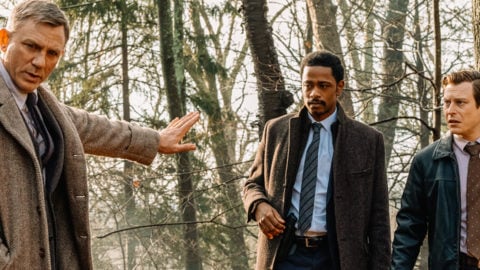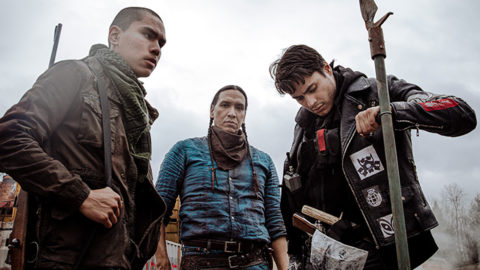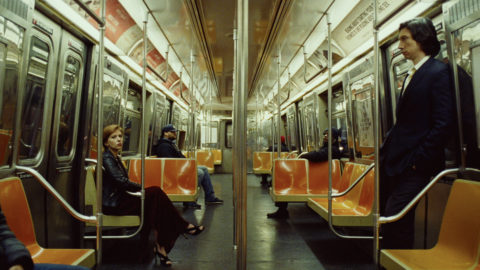Dispatch: Toronto 2019
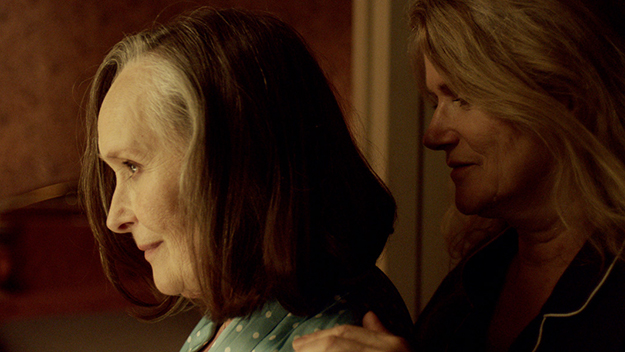
Two of Us (Filippo Meneghetti, 2019)
Love’s in need of love today, and many titles at this year’s Toronto International Film Festival seemed determined to safeguard it against all comers. Prime among these, and a tearjerker par excellence, Filippo Meneghetti’s debut feature Two of Us positions the long-term lesbian love between two aging apartment building neighbors as the last stronghold of true romance. The keepers of the flame are Nina and Madeleine—affectionately, “Mado”—played with committed passion by Barbara Sukowa and Martine Chevallier. Living across the hall from one another, they’ve been in an affair for decades that Nina has kept secret from her grown children and, as we surmise, from her husband when he was alive. Now that they’re getting on in years, the bolder, more outspoken Nina wants Mado to come clean to the world about their relationship, so they can hasten a move to Rome, the dream place where they can live out their golden years.
Many obstacles are thrown in their path, though, and they’re of the Douglas Sirk variety: it’s the selfish, meddling kids—siblings Anne (Léa Drucker) and Frédéric (Jérôme Varanfrain). And especially with the invaluable Sukowa—perhaps best remembered by many for her work with Fassbinder in Berlin Alexanderplatz and Lola—as its central figure of driven romantic desperation, Two of Us consistently evokes an earlier era of melodrama, yet miraculously without any distancing aesthetic mannerisms or metatextual self-consciousness. This is simply a shot-from-the-heart work of emotional earnestness, filmed in burnished autumnal colors and attuned to the minutest expressive navigations of its two wonderful leads, and it had me on the verge of weeping multiple times. There’s an extended shot of an unattended pan left burning on a stove that I will return to often, but its most recurring image is one of closed doors, barriers between people who only want to love and be loved but are again and again separated by cruelties of both circumstance and human frailty.
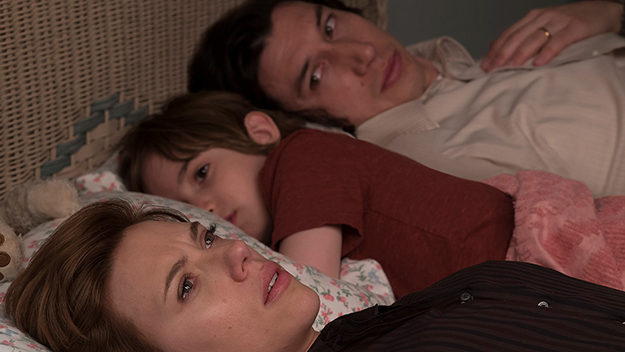
Marriage Story (Noah Baumbach, 2019)
Also contributing to what turned out to be a wildly emotional TIFF was Noah Baumbach’s Marriage Story, which, for me, amounted to 136 minutes of trying to figure out how to stop the tip of my nose from quivering. It may be Baumbach’s tenth official feature, but it might as well be his first for the primal pull it exerts and for the almost complete sloughing off of the mannerisms and tendencies of his earlier films—which, for the record, I almost uniformly like. This time, Baumbach’s everyone’s-right-everyone’s-wrong approach feels less like pinpointing hypocrisies than a gesture of pure compassion, which better than ever brings out the frustrated humanity that has been at the core of all his films. As a gradually escalating depiction of the emotional and legal turmoil of a thirty-something couple’s divorce, Marriage Story feels like a procedural, and a particularly grueling one. Watching Scarlett Johansson’s Nicole and Adam Driver’s Charlie try to instill fairness and reason into a situation that, due to the realities of their careers and the existence of their young son, becomes absolutely impossible, one might feel like helpless bystanders to a highway auto accident.
Driver has struck me at times as a hyper–self-aware actor—especially on Lena Dunham’s Girls and in Baumbach’s own, much broader While We’re Young—but his undeniable craft is on gargantuan display here; he’s stripped bare of all pretense. Even when he sings a persuasive rendition of “Being Alive” from Sondheim’s Company—Noah, are you literally trying to kill me?—he miraculously divests the moment of any sense of distanced theatricality. Johansson hasn’t seemed as completely absorbed into a role since Under the Skin: that the same actor can so fully inhabit that earlier film’s oblique, alien blankness and this character’s conflicted emotional swings and thrilling transparency should forever silence anyone who could doubt her skills. Marriage Story makes its tortured way through conversations of financial burden, “reasonable” arguments that devolve into harrowing screaming matches, and increasingly nasty court proceedings; it’s clearly a movie that has no love lost for lawyers, despite mesmerizing, detailed character work from Laura Dern, Ray Liotta, and Alan Alda, for whom all this horror is, depressingly, just another day’s work. Afterward, I felt like Ethan Hawke’s Jesse from Before Sunset: if someone were to touch me, I’m sure I would have “dissolved into molecules.”
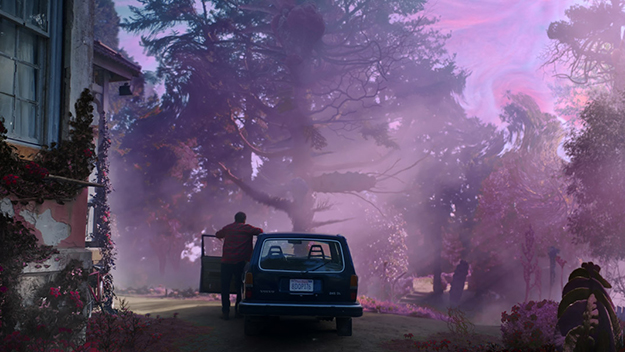
Color Out of Space (Richard Stanley, 2019)
Another marriage on the rocks is at the center of Richard Stanley’s Color Out of Space, though this rock happens to be a literal meteor. The alien object has crash-landed in the backyard of a New England family’s farmhouse and proceeds to get in the water and infect the household in ways both psychological and body horror-ific. Perhaps my favorite of all H.P. Lovecraft stories, 1927’s “The Color Out of Space” is a singularly despairing piece of writing and, as I have long and perhaps rightly assumed, unadaptable—at least into this kind of flat, character-driven genre narrative. Written with his usual florid description but also a detached, omniscient voice that surveys decades of organic and vegetative aftermath, it’s not the type of story that needed to be personified in the screeching, mannered style of one Nicolas Cage, whose escalating nuttiness as the Gardner clan’s patriarch is, if nothing else, certainly on brand. I surely tired of hearing him rant about the alpacas he keeps in the shed out back, but I tired even more of hearing the audience laugh like programmed hyenas every time he said the word “alpacas.”
There should be a certain power inherent in seeing Cage’s Nathan and Joely Richardson’s Theresa cope with their failing minds and twisting bodies as they struggle to hold onto their lives and marriage, but Stanley neutralizes the material by erring on the side of goofball. One of Stephen King’s favorite stories, “The Color Out of Space” clearly inspired his delightful “Lonesome Death of Jordy Verrill” segment from George Romero’s Creepshow, which proves that this material can indeed be mined for camp without forgoing the central melancholy of the text.
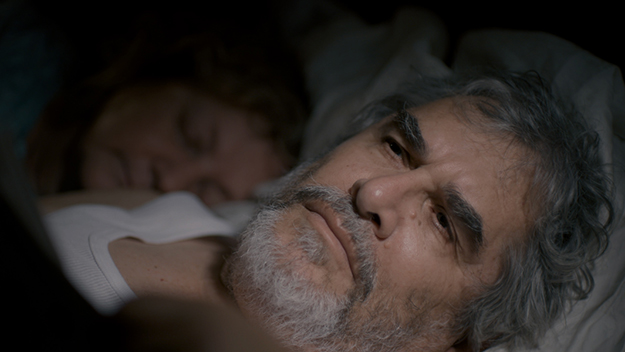
Africa (Oren Gerner, 2019)
After all these high-intensity tales of possibly doomed coupledom, it felt like a relief, at least at first, to settle into the long-term, seemingly happy marriage that is at the center of Africa. That willfully misleading title disguises Israeli filmmaker Oren Gerner’s rather lovely and accomplished feature debut, one that might sound overly precious—if not insufferable—based on the description: a mostly scripted fiction-documentary hybrid in which the young Gerner casts his own parents—Meir and Maya Gerner—as versions of themselves, living in their own house, and dealing in small but significant ways with the incremental changes of entering their twilight years; the title springs from vacation footage taken by Meir and Maya that the film intermittently cuts to, memories of escape and dislocation. The details of the production and the provenance of the images, however, are ultimately incidental if the audience simply believes what it sees as a cause-and-effect “acted” narrative, and Gerner has somehow coaxed, shot, and cut—with editor Gil Vesely—performances of surpassing subtlety and depth from these non-actors, especially from his father, Meir Gerner, around whose escalating frustrations the film eventually pivots.
In alighting on his father’s increasingly implosive nature, Gerner moves almost imperceptibly from the general to the specific: in subtle, matter-of-fact ways, Africa reveals itself as about Israeli masculinity. It’s a much less frenetic version of this topic, of course, than Nadav Lapid’s excellent Synonyms—which was also at TIFF following its Berlin premiered—but it certainly has its own cumulative power, and its technical sleight of hand is no less impressive on its own budgetary terms. The film is prismatic rather than episodic, with small domestic and community events piling up to create a portrait of quiet desperation. Everything Meir does, including the overly complicated task of building a bed for his grandson, takes on metaphorical weight. By the end, following one of its best scenes, in which one of Meir’s grandkids interviews him about his life for a school project—an exchange that gives us crucial background information about Meir while also intimating future generations’ possible indifference to his past—we have seen a portrait of refreshing ambivalence about family, community, and nationhood. At one point, Meir tells his grandson he was born in 1948, underlining that it’s the same year as the founding of Israel; no wonder, then, that he seems to be constantly on the verge of blinkered, withering failure.
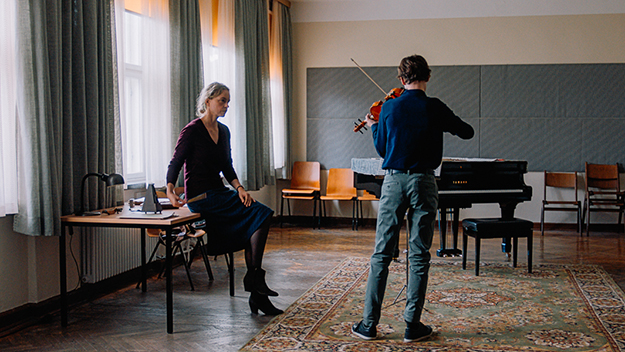
The Audition (Ina Weisse, 2019)
Ina Weisse’s The Audition is another portrait of a character whose seemingly structured everyday existence masks imminent crackup. In this case, it’s the severely named Anna Bronsky, a music teacher at an illustrious Berlin conservatory who takes on a promising yet untested violin student, Alexander (Ilja Monti), and gradually drives herself and him wild with agitation and worry. As played by Christian Petzold’s erstwhile muse Nina Hoss, Anna is a mess of frantic contradictions and chronic dissatisfactions, yet Weisse and writer Daphne Charizani are so careful not to lay bare a clear, readable psychological assessment of her that the film takes a while to make its intentions clear. As a result, it feels like a slow-burn thriller without any clear generic parameters, its suspense generated strictly from the increasing sense of desperation and claustrophobia that descends upon Anna, whether she’s engaging in an almost-affair with a fellow teacher, growing ever more distant from her patient husband (Simon Abkarian, doing quite a lot with an ambiguously supportive role), or, most dramatically, engaging with Alexander at the expense of her slightly younger, bitter son (Serafin Mishiev).
All this simmering resentment builds to free-floating unease, then an emotional rupture, and finally a left-field tragedy that makes psychological sense but feels unnecessarily cruel. Holding it together, of course, is Hoss, whose tightly coiled cheek muscles provide all the drama any film would ever really need. As a portrait of unraveling, it’s at times effectively nerve-jangling, but merely sufficient; as a topographical inquiry into the landscape of Hoss’s face, it’s occasionally hypnotic. She’s onscreen almost constantly, which makes The Audition at the very least highly watchable. For a film that seems partly about the misguided—or misplaced—drive for perfectionism, a little more aesthetic stringency might have sealed the deal. Nevertheless, like every anxiety-producing movie I saw at TIFF, there are images and emotional turnabouts here that I’m unlikely to forget anytime soon.
Michael Koresky is a writer, editor, and filmmaker in Brooklyn. He is cofounder and editor of the online film magazine Reverse Shot, a publication of Museum of the Moving Image; a regular contributor to the Criterion Collection and Film Comment, where he writes the biweekly column Queer and Now and Then; and the author of Terence Davies, published by University of Illinois Press, 2014.



